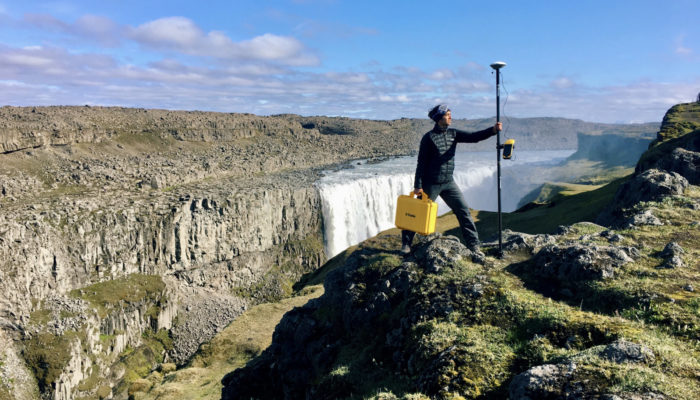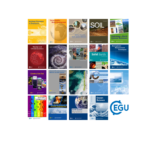
Preprints are in the spotlight this month at EGU, with the newest feature of our Open Access repository EGUsphere now officially available! As we observe this new milestone, EGU is aware of the important role that its moderators will play in this process. This week, four EGUsphere moderators tell us what they look forward to in their new role and encourage other geoscientists to join in the experience.
So say hello to Silvia De Angeli, fixed-term assistant professor at University of Genoa, Alan Pak Lun Fung, PhD researcher at University of Helsinki, Jaya Khanna, Assistant Professor of Earth & Planetary Sciences at the National Institute of Science Education and Research (India), and Kathryn Fitzsimmons, Max Planck Research Group Leader at the Max Planck Institute for Chemistry, Mainz.
Why did you decide to volunteer as an EGUsphere preprint moderator?
Kathryn: I was really excited to hear about the new EGUsphere preprints platform. I feel that online preprint forums are increasingly important to communicate new scientific research, and I was particularly pleased to hear this initiative being put into place by EGU! EGUsphere will provide the European geosciences community with a suitable, accessible platform to disseminate and stimulate discussion on new ideas and insights. I have enormous respect for EGU’s leadership in driving open access, transparent review structures and novel approaches to scientific communication, and am honoured to take a more active role in this process as a moderator.
Jaya: There were two reasons. I wanted the experience of what it is like to be a journal editor, without bearing the full responsibility of it at this stage of my life. I made this choice so that I can better balance my professional and personal life, as the latter is quite demanding with my new-born. However, I do want to stay connected with my scientific peers and I also aspire for a journal editorship role later in my career. The moderatorship at EGUsphere offers a good opportunity to meet both of my objectives.
Alan: As an early-career researcher, I decided to volunteer because I am interested in knowing more about the editing and reviewing process and I would like to do my part to contribute to the science community. I would also love to expand my network in EGU outside of my institute. Furthermore, it gives me a chance to get a glimpse of preprint papers of interest, so that I can stay abreast of cutting-edge research in my field, which can inspire me to improve and direct my research ideas.
In your opinion, what is the difference between volunteering as a preprint moderator, instead of in a normal ‘editor’ position?
Jaya: As far as I understand, the job of a moderator is to assist the editor with the initial quality checking. However, a moderator will have a choice to take up a task or decline it as per their availability. So, there is opportunity for flexibility. There will be several moderators providing their services under the same editor, so the workload will be distributed.
Silvia: I think there are pros and cons to both these options. A normal editor position would give you more visibility and provide you with significant endorsement for your CV. Having said that, the editor role would require much more experience and a higher commitment in terms of time. On the other side, the role of a preprint moderator requires a lower level of experience and would be less time demanding. Furthermore, it can be seen as an occasion to start to gain real-world experience in open-access publishing and as a first step to reach higher-level roles, such as the normal editor positions in open-access journals.
Kathryn: I have a bit of experience with the standard editing process, having held editorial roles for multiple journals since 2007. Within the scope of these roles, I have done my best to raise the visibility of the respective journals, including spearheading conversion to open access in one case. And while I believe there will always be a place for ‘normal’ editing, monitoring preprints requires a different kind of engagement with scientific communication; it is about getting new ideas out there and encouraging active discussion in the community more collectively, rather than coordinating a more limited dialogue between authors and reviewers. I’m pretty excited about the opportunity to help facilitate this with the EGU.
Can you tell us about what you are looking forward to most about being an EGUsphere moderator?
Alan: I am excited to get familiar with the pre-screening process, so that I can speed up timelines and shorten author waiting times. I understand that authors can be impatient when they must wait for next stage during the process. I hope as the moderating work gets smoother, I can help streamline things and reduce their waiting times.
Silvia: I look forward to reading some stimulating research works related to my field of expertise and building a solid background in open-access publishing. I will be happy to actively contribute to open science, increasing the sharing of scientific results among our community.
Jaya: I’m looking forward to getting connected with my scientific peers the most. I am also looking forward to staying updated about current research in my current and allied fields.
Who can volunteer to be an EGUsphere preprint moderator?
Kathryn: I would say anyone in geosciences with an open mind and enthusiasm for discussing, and encouraging discussions about novel science, including early-career researchers. It would be great to see a diverse range of academic ages, genders, and backgrounds on the team – I strongly believe that diversity is key to driving fresh perspectives and encouraging ALL scientists to take part.
Silvia: I think any interested scientist involved in geosciences can become a preprint moderator. In particular, this could be a great occasion for Early Career Scientists who are interested in being more involved in the activities of the European Geosciences Union and want to increase their skills in open-access scientific publishing.
Alan: Members of the EGU community and other interested scientists, especially early-career scientists, are all welcome to self-nominate to become an EGUsphere moderator. All that’s required is two endorsements: one from a supervisor or colleague and one from a member of the EGU Council or Publications Committee.
We thank our moderators for their time and inputs to this story. For more information about EGUsphere’s preprint options, click here. To register your preprint for file submission, click here.




